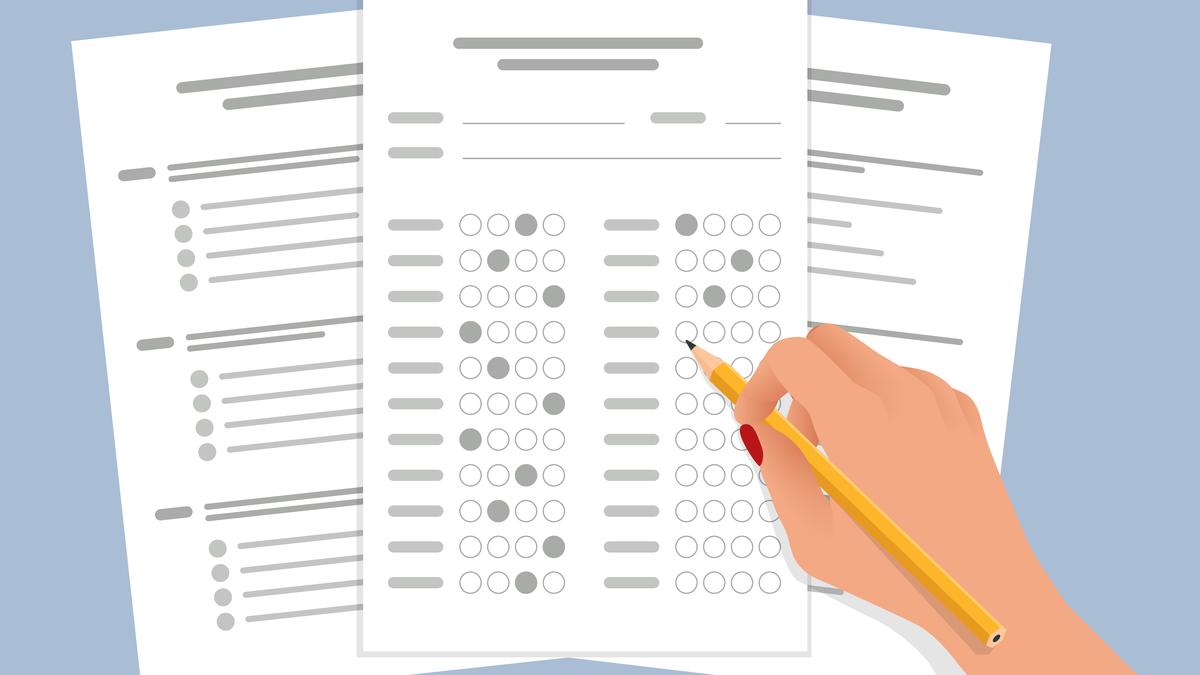The student filling out answers to exam test answer sheet with a pencil. School and Education. Test score sheet with answers. 21EPBS_CUET_Page 2
| Photo Credit: Golden Sikorka
A paper published on July 24, 2025, by Carmelo Vicario et al., titled ‘Timing Matters! Academic assessment changes throughout the day’ in the journal Frontiers in Psychology presents an analysis of the academic performance of over 1,04,552 students across Italy. The study finds that the time at which they take their examination matters. Examinations conducted between 11 am and 1 pm were found to offer very good results, with those taken at around noon being the best, while those conducted between 8 and 9 am and between 2 and 5 pm threw up poorer results.
The timing of critical decisions can thus have far-reaching consequences. The success rate followed a bell curve with a peak at noon. That is, there was no significant difference in the chance of passing the exam if one sat for it at 11 am or 1 pm, but the chances of passing were lower if the exam was taken at 8 or 9 am or at 3 or 4 pm. The chance of passing was equivalent in the early morning and in the late afternoon.
“These findings have wide-ranging implications,” Prof. Alessio Avenanti of the University of Bologna and a co-author of the study said. “They highlight how biological rhythms, often overlooked in decision-making contexts, can subtly but significantly shape the outcome of high-stakes evaluations.”
Although the study did not identify the mechanisms behind this pattern, the peak in the number of students passing at midday is consistent with evidence that cognitive performance improves over the course of the morning before declining during the afternoon. Students’ falling energy levels could lead to diminishing focus, compromising their performance. Professors might also experience decision fatigue, causing them to grade answer papers more harshly.
Meanwhile, poorer results earlier in the day could be down to competing chronotypes, or body clocks. People in their early 20s are usually night owls while people in their 40s or more tend to be morning larks. The students thus might also show sleep inertia: low cognitive performance at a time when the professors are most alert.
“To counteract time-of-day effects, students might benefit from strategies like ensuring [good] quality sleep, avoiding scheduling important exams during personal ‘low’ periods, and taking mental breaks before performance tasks,” Dr. Vicario, of the University of Messina in Italy, suggested. “For institutions, delaying morning sessions or clustering key assessments in the late morning may improve outcomes.”
But more research is needed to fully understand the factors that contribute to the influence of the time of day on academic performance and to develop ways to ensure fairer assessments.
“While we controlled for exam difficulty, we can’t entirely exclude other unmeasured factors,” said Prof. Massimo Mucciardi of the University of Messina and a senior author. “We couldn’t access detailed student- or examiner-level data such as sleep habits, stress or chronotype. This is why we encourage follow-up studies using physiological or behavioural measures to uncover the underlying mechanisms.”
While this research was in Italy, the findings may well apply in India, when students appear for many entrance exams, which are typically held during the daytime, with morning and afternoon sessions. For example, the Common University Entrance Test (CUET) is conducted in two slots at 9-12 am and 3-6 pm. If we go by the Italian example, the slots are better off being at 9-11 am and 12-2 pm.
Published – September 20, 2025 07:00 am IST
